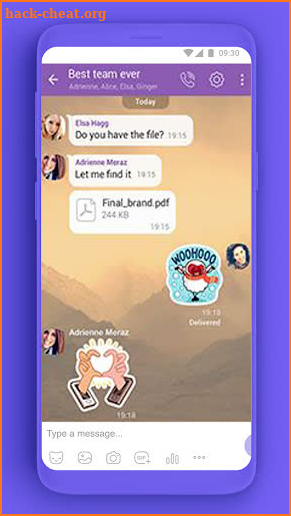



Without doing so, Daniel Zappala, a computer science professor who worked on the study, told that 'a clever hacker could make you think that you are encrypting your messages to your partner (let's call her Alice), when in reality, you are encrypting your messages for an intruder (let's call her Trudy).' The process allows users to confirm the identify of their intended conversation partner and makes sure no other third party can trick you into revealing the contents of your messages. WhatsApp and Viber, however, both tout their end-to-end encryption is automatic and makes it so even they can't access your messages, which leads many users to believe their conversations are secure.īut that's not the case - to truly encrypt messages, all three apps require what's called an 'authentication ceremony.'

In fact, as Viber shows, it is only growing, and soon it will be impossible to ignore.'It is possible that a malicious third party or man-in-the middle attacker can eavesdrop on their conversations,' said Brigham Young University computer science PhD student Elham Vaziripour, who led the recent study.įacebook messenger doesn't offer automatic encryption but allows users to set it up themselves. So the stand may be a public relations response, but it reflects a growing public and corporate anxiety about government overreach that isn’t going away. But in reality, WhatsApp and Viber have been developing these features since at least 2013, when Edward Snowden leaked the most significant batch of documents detailing government hacking and eavesdropping. The recent expansion of end-to-end encryption following the FBI-Apple battle may seem like the first stand tech is taking against an encroaching governmental superstructure. (In fact, a recent Motherboard report indicates BlackBerry may have provided police with an encryption key to its messenger.) Certainly widespread adoption of end-to-end encryption makes it harder for legislators and judges to consider the merits of nixing the feature altogether, though all of these companies must understand that some level of compliance with law enforcement is necessary in a nation of laws. These big technology companies may just be positioning themselves to make certain concessions to law enforcement without sacrificing the principle of encryption. As Matthew Green, a professor of cryptography at Johns Hopkins University, notes, the wave of platforms adding end-to-end encryption represents a turning point in the relationship between law enforcement and big tech companies. The security itself resembles WhatsApp’s recent upgrade, so the issue is not whether the company is setting any new precedents. Like Apple and the iPhone, Viber itself won’t have access to users’ passcodes, and therefore won’t be able to hand them over to, say, the FBI. This means that exchanges, beyond being transmitted in encryption, won’t be accessible from even a front-facing scenario without inputting a passcode. The company is also encrypting conversation via its new “hide” feature, which allows a user to lock any chat from users on their phone behind a four-digit pin. Green requests additional verification, and Red is a warning that the user you are talking to has failed authentication or the app has reason to believe someone is trying to hack in from a third-party platform. The app will, à la Gmail, offer color-coded indicators beside each chat to clarify whether you are communicating with a verified or trusted user. Viber plans to roll out a host of new features in the coming weeks to provide users with a clear picture of how secure their communications are. Not only does this level of security make breaking into the app almost impossible, it also means that Viber may not be able to provide law enforcement with access to the communications of an alleged criminal. The new encryption means that Viber will not be able to access the content of user messages or conversations. As an indirect response to the FBI’s efforts to force Apple to unlock an encrypted iPhone, the wave of new encryption signals a turning point in the future of digital privacy. The move follows WhatsApp’s decision to protect the communications of its more than a billion users with end-to-end encryption earlier this month. Messaging and voice app Viber announced on Tuesday that it is adding end-to-end encryption to its platform of 711 million users.


 0 kommentar(er)
0 kommentar(er)
